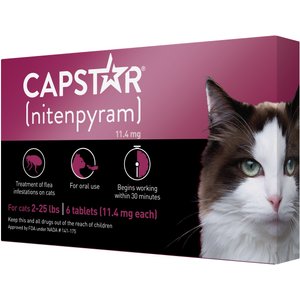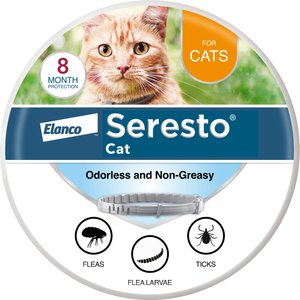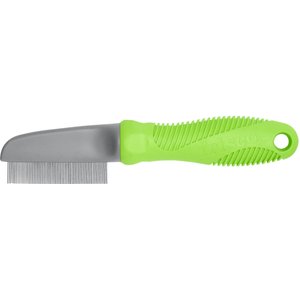For those of us with cats who love to live their best lives in the great outdoors, protection against fleas is especially important. Because outdoor cats face more year-round flea exposure—from interaction with other cats to the locations they may explore, they’re at a higher risk for fleas.
We talked to two vet experts to break down the types of flea treatment for outdoor cats.
In This Guide:
Do Outdoor Cats Have Fleas?
Outdoor cats will likely come in contact with fleas. If your cats live exclusively outside, they’re susceptible to fleas wherever they go, including garages, barns, and any place they interact with other animals, says Kelly Ryan, DVM, director of Cityscape Vets on Excelsior in Minneapolis. And if you have a cat who lives both indoors and outdoors, you have a greater risk for a flea infestation in your home.
In short, no matter how much time your cat spends outside, they need protection against fleas.
Prescription vs. OTC Flea Control
There are two overall categories of flea treatment products: prescription, those prescribed by your veterinarian, and over-the-counter (OTC), those pet parents can purchase without a prescription from their vet. Prescription is generally preferred among veterinarians.
“Prescription treatments are specifically tailored to your pet's needs with the guidance of a professional, enhancing the safety aspect,” says Sara Ochoa, DVM, a veterinarian at Animal Hospital of West Monroe in West Monroe, Louisiana.
Dr. Ochoa adds that prescription flea treatments “often contain newer, more advanced ingredients or combinations that aren't available OTC, offering better protection against flea infestations.”
Plus, prescription flea medicine undergoes a rigorous testing process that may be more involved than what occurs with an OTC flea preventive, making it safer for your outdoor cat.
The first step to using prescription flea control is to talk to your veterinarian, who can prescribe the most appropriate flea control for your cat. For example, they may prescribe a prescription chewable, like Comfortis™ chewable tablets, or a prescription topical treatment, like Bravecto® topical solution.
6 Types of Flea Treatments for Outdoor Cats
Avoiding a flea infestation is easier and cheaper than clearing one up, says Dr. Ryan, so flea prevention is the best medicine.
If your outdoor cat already has fleas, treating them is the first step, and preventing future infestations is the (close) second. Basically, you need to know how to get rid of fleas on outdoor cats and how to keep fleas off outdoor cats. Luckily, you have options.
The best flea treatment for outdoor cats depends on each cat’s activities, temperament, medical conditions, and life stage, along with your own needs as a cat parent.
Let’s look at our choices—but remember, your vet will recommend the best flea treatment for your cat.
1. Prescription Chewable Flea Control
Prescription Chewables
Chewables are exactly what they sound like: pills your cat can chew and swallow. Often, hiding them in a pill pocket is the easiest route. Just make sure your cat eats the entire pill and does not spit it out or eat around it.
It’s worth noting, however, that vets do not recommend hiding pills of any kind in food, because it can cause food aversion, which can be hard to overcome—especially in cats. You also have to ensure they eat the whole pill.
Dr. Ochoa says there are many pros and cons to prescription chewable flea preventives.
Pros of prescription chewables:
- Easy to administer: “Chewables are as easy as giving your pet a tasty treat,” Dr. Ochoa says.
- Mess-free: Unlike spot-on treatments, which can leave residue on your cat’s fur, chewables leave no trace.
- Fast-acting: Many chewable options start working within hours, which helps break the life cycle of the flea by killing them before they can lay eggs.
- Accurate: “With topical treatments, there's always a risk of applying it incorrectly,” says Dr. Ochoa. “Chewables eliminate this concern.”
- Won’t wash away: If your outdoor cat enjoys playing in water or gets caught in the rain, there’s always a risk that the efficacy of the spot-on treatments can be affected. Chewables help ensure your cat is protected, no matter their outdoor activities.
- Safe for sensitive skin: “Pets who react poorly to topicals may tolerate oral treatments better, as there's no skin contact,” says Dr. Ochoa.
Cons of prescription chewables:
- Can cause side effects: Although rare, prescription chewables can cause side effects, including gastrointestinal issues such as vomiting or diarrhea, Dr. Ochoa says. Rarely, cats have more serious reactions, such as weight loss, decreased appetite, lethargy, increased breathing rate, and blood work changes.
- Taste aversion: “Some picky pets might not like the flavor and therefore might be reluctant to take the chewable,” Dr. Ochoa says.
- Must be given with food: Brands such as Comfortis™ and Credelio® need to be given with food, and this could be a turn-off for pet parents.
- Possible allergies: As is the case with any medication, there’s a small possibility your cat could have an allergy or intolerance to an ingredient in the chewable. For example, Comfortis™ is beef-flavored, so it should be avoided in cats who are allergic to beef, while Credelio® has vanilla and yeast flavoring. As is the case with any flavored medication, you should always consult with your primary care veterinarian or product manufacturer before administering to your cat if they have a food allergy.
Note that most oral flea meds are prescription-only, but one can be purchased over the counter (OTC): Capstar®. Capstar® is an effective oral flea treatment option that kills adult fleas and can be given daily. It does not kill ticks, flea eggs, larvae, or immature fleas. However, Capstar® is not a preventive as it only lasts for 24 hours, so it should not take the place of one.
2. Prescription Topical/Spot-on Treatments
With topical or spot-on flea treatments, typically a small amount of liquid is applied directly to your cat’s skin, usually between their shoulder blades. With topical prescription flea medications, it’s important to follow the directions provided by your veterinarian.
Both topical and oral prescription flea medications help to stop the life cycle of the flea. Once adult fleas are killed, they can’t lay eggs, preventing the larvae and the pupae stage of the flea life cycle.
Here are the pros and cons of topical flea treatments:
Pros of topical flea treatments:
- Easy to apply: Part your cat’s fur and apply the tube of medication directly to their skin. It should be applied to the base of the head, where the cat is not able to lick the product off.
- Provides enduring protection: Once you’ve applied a topical flea treatment, your cat is wearing an invisible shield for one month or more—as long as it’s applied correctly and according to the directions. If you plan to give your cat a bath, however, read the package insert, ask your veterinarian, or contact the manufacturer to find out how long you need to wait after applying the flea treatment before bathing your cat.
- Picky-cat proof: For cats who are picky eaters or don’t like pills, a topical flea medication might be an easier option. Also, with topical, pet parents don’t have to worry if their cat eats the entire pill.
Cons of topical flea treatments:
- Residue: Topical prescription flea treatments will leave a temporary residue and may have a slight odor.
- Contact concerns: Pet parents should wash their hands after applying topical prescription flea medications to their cat, as well as keep other pets or children away from the cat for a short period after treatment.
- Skin sensitivity: Rarely, a cat may experience a reaction to the treatment.
It’s always a good idea for pet parents to double-check that the product they’re using is labeled for cats and the product is the correct weight range for their cat.
Multipurpose Flea Control Meds
Outdoor cats are also more susceptible to other parasites, like ticks, heartworms, roundworms, hookworms, and ear mites.
To give your cat maximum protection, discuss with your veterinarian about using a prescription flea medication that also protects against these internal and external parasites.
Heartworm
“Some of the topical flea control products, like Revolution® Plus or Advantage Multi®, also protect against heartworm disease, which is a risk for cats as well as dogs and can often be life-threatening,” Dr. Ryan says.
Ticks
Ticks are another concern. While all cat lifestyles put them at risk for fleas, outdoor cats are also at risk of ticks, which can transmit diseases to your kitty.
The good news? There are prescription flea medications that can prevent ticks too. For example, Bravecto® Topical Solution not only offers up to 12 weeks of protection against fleas, but it also protects against American dog ticks for eight weeks.
Roundworms, hookworms, and ear mites
We know, we know, this list of pests is getting a little long. However, outdoor cats are at an especially high risk for picking up unwanted travelers.
The good news is that some products also offer protection against other parasites:
- Revolution® Plus is an all-in-one topical prescription medication that kills fleas and ticks, while helping to prevent heartworms and treat and control ear mites, hookworms, and roundworms.
- NexGard® Combo kills fleas; helps prevent heartworms; and helps treat and control roundworms, hookworms, tapeworms, black-legged ticks, and Lone Star ticks.
- Bravecto® Plus helps prevent heartworms, kills fleas, treat roundworms and hookworms, and controls black-legged ticks, American dog ticks, and Asian longhorned ticks.
3. OTC Topical/Spot-On Treatments
When it comes to dealing with fleas, there are OTC products that don’t require a prescription to treat and prevent fleas. Products like Advantage® II or Frontline® Plus can be purchased without obtaining a prescription from your vet.
However, before starting any new OTC flea medication for your outdoor cat, always consult with your veterinarian first, especially if your cat has health issues.
Your vet can discuss the following:
- How fast the product will take to work
- How to properly administer it
- How often it should be administered
- How to properly store the medication
- If there are any side effects
- If there are any issues with bathing your cat or getting them wet
- If the product is the correct weight range for your cat
- If it’s safe for your cat’s particular life stage or age
- What to do if your cat gets too much of this medication (overdose)
Triple check that you’re using a spot-on treatment specifically for cats. Many spot-on treatments for dogs contain an insecticide called permethrin. It’s safe for dogs, but it is extremely toxic to cats and can cause tremors, seizures, and even death. Always only use products labeled for cats on cats.
4. Flea and Tick Collars
Certain outdoor cats return to the same home every night. But if your cat’s more of a “see you when I see you” kind of pet, coming and going as they please, make sure they’re protected for the long haul.
Consider the Seresto® flea collar, which lasts for eight months, and is waterproof, odorless, and doesn’t leave a greasy residue on your cat.
Cons of the Seresto® flea collar include:
- Possible skin irritation: The most common side effects of the Seresto® collar are scratching and minor hair loss and irritation where the collar touches the cat’s neck.
- Incomplete coverage/inconsistent efficacy: Seresto® doesn’t offer protection against heartworms, intestinal parasites, or ear mites.
- Potential for toxicity: Keep children from playing with the Seresto® collar and prevent pets from chewing on it. Follow all other product instructions to keep you, your cat, and others safe.
- Strong odor: Some pet parents notice their cat’s flea collar has a strong smell. However, this may be less of an issue if your furry friend spends notably more time outdoors than indoors.
5. Flea Shampoos
When it comes to flea treatment for outdoor cats, some grooming products, such as flea and tick shampoo, can be helpful to use for moderate infestations and when recommended by your vet.
Flea shampoos such as Advantage® may kill fleas on contact, but they shouldn’t take the place of your cat’s regular flea prevention medication, because they won’t offer protection from future parasites.
Talk to your veterinarian about whether flea shampoos are useful for your cat.
6. Flea Combs
While the best flea treatments for cats are prescription oral or topical flea medications, you can also use flea combs to help get fleas under control.
The Safari® flea comb is especially useful for finding fleas that might be trying to catch a ride indoors.
Another pet parent favorite flea comb is the budget-friendly Frisco® flea comb. Several reviewers noted it’s comfortable for them to use, which is a good feature for a task that takes time.
The benefits of using a flea comb don’t stop at flea control, though. “Brushing and combing your cat will also help his coat stay healthy and can reduce the number of hairballs—all great benefits to regular grooming,” Dr. Ryan says.
Yard Treatment
Don’t forget your yard! Your outdoor cat will almost certainly spend time there. Yards are always at risk for a flea infestation, but this is especially true if you have an outdoor cat who comes and goes; so, it’s important to treat the cat’s environment to eliminate a flea infestation.
In addition to following landscaping tips to make your yard less hospitable to fleas, you should also use a spray, like Wondercide® Flea & Tick yard spray. Read the directions carefully, and do not allow your cat back into the yard until it’s safe, based on the manufacturer's directions.
What Makes Fleas So Bad, Anyway?
Besides causing your cat stress and discomfort, fleas can cause health issues in your cat. Dr. Ochoa says cats can experience the following flea-related issues:
- Skin irritation and infection
- Anemia
- Tapeworms
- Flea allergy dermatitis (FAD)
- Transmission of disease, such as cat scratch fever, typhus, mycoplasma haemofelis, and tapeworms, to humans
More about cats and fleas:
Share:
























